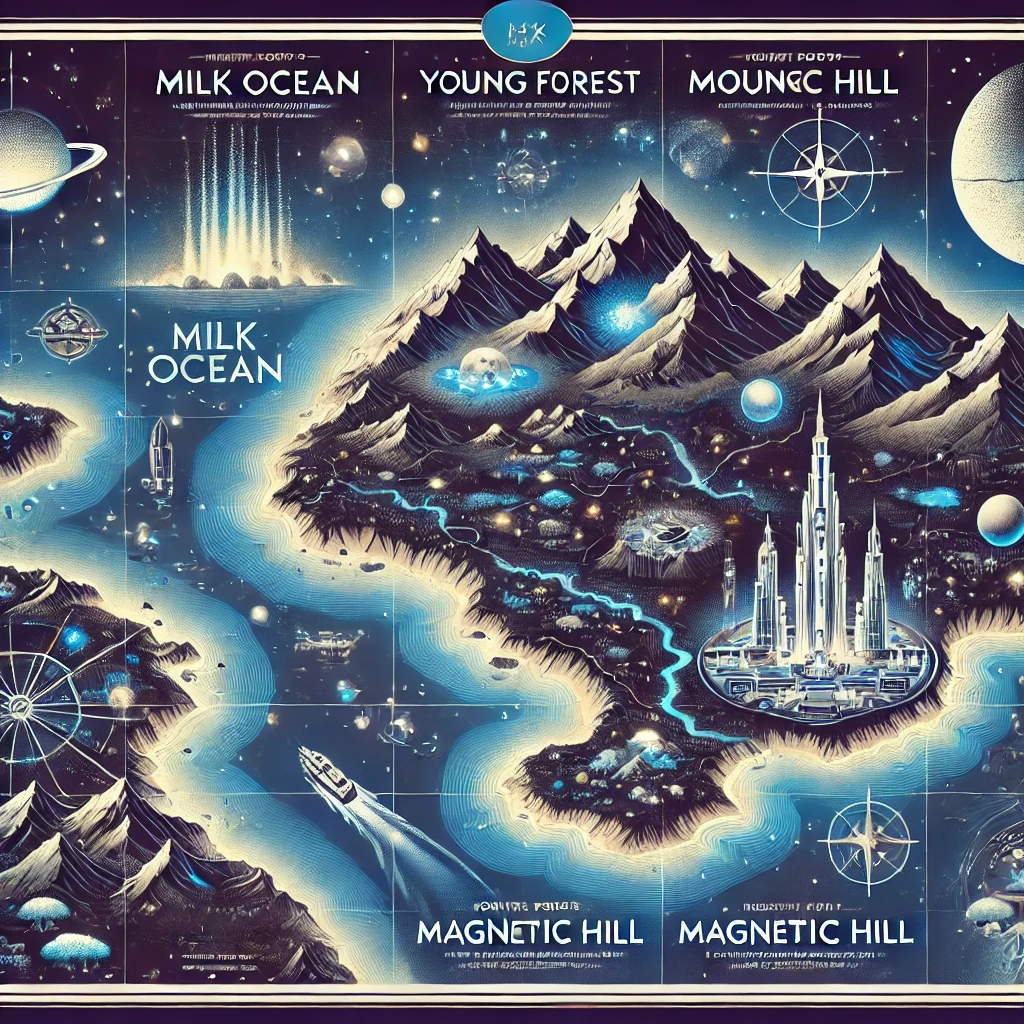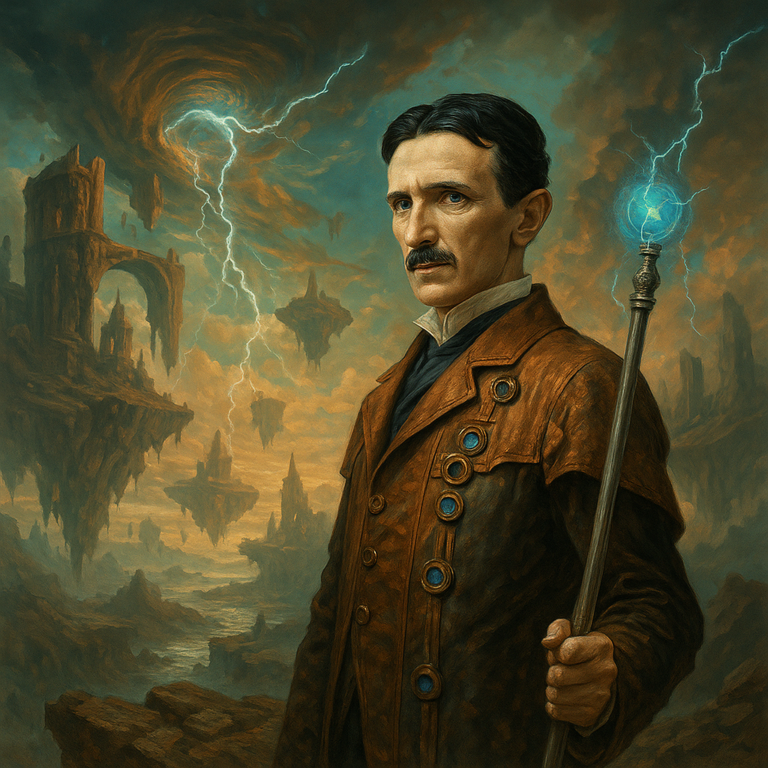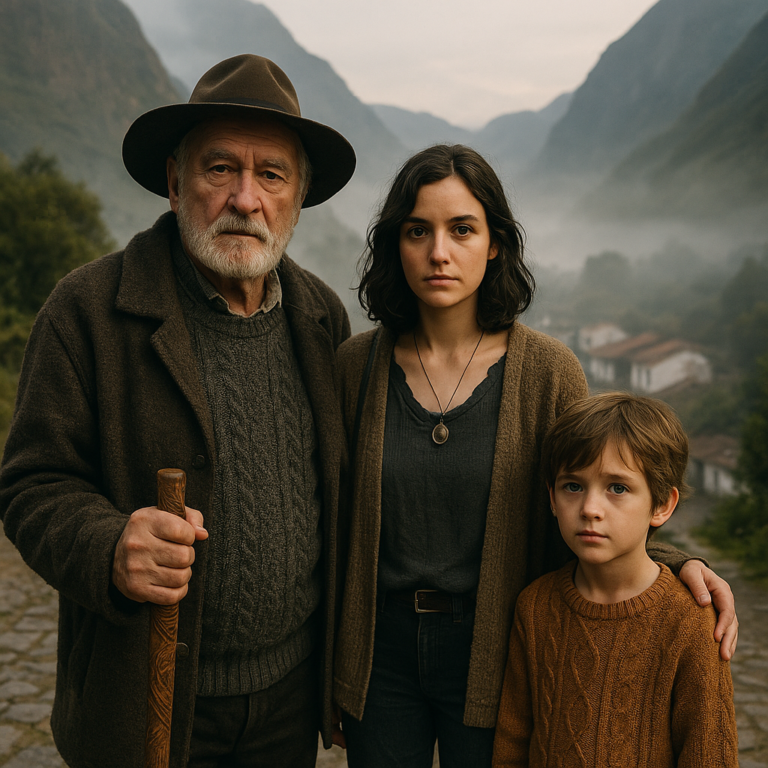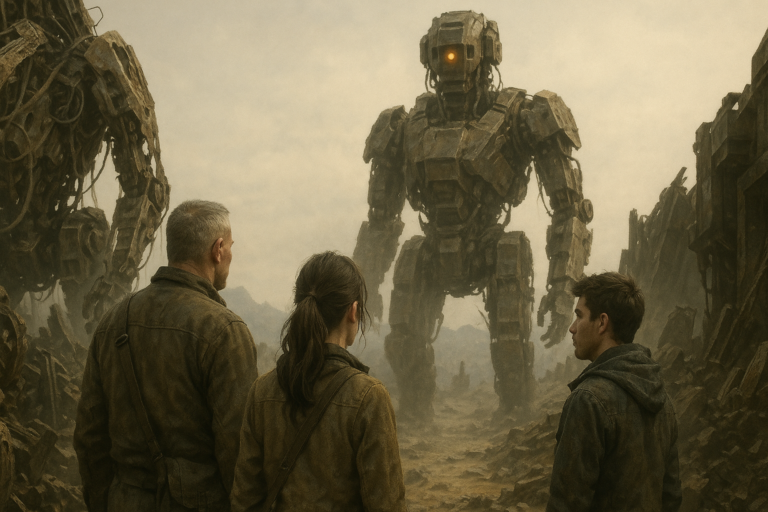Mēkanon end the Chronicles of the Galactic Palate
Chapter 1: The Taste of Memory
The blackness of space stretched infinitely, pierced only by the silver glimmer of distant stars. Amid this grand silence, a vessel glided like a blade across silk — a Mēkanon war-cruiser, known in the common tongue as The Palate-Seeker. Its hull shimmered with ever-shifting metallic hues, coded not for camouflage, but for prestige. It was the jewel of the robot empire, a ship powered by quintessence reactors and guided by the finest synthetic minds.
Inside, two figures stood in solemn stillness before a viewport, watching a swirling portal of interdimensional energy collapse into nothingness behind them. They had crossed the Veil — the final border between their galaxy and the uncharted ones.

Korr stood like a statue, arms clasped behind his back, his form sheathed in armor that resembled a sculpted fusion of knight and machine. A small blue light pulsed in the center of his chest, synced to his processing rhythms. Dymia, beside him, leaned casually against a railing, her fingers tapping the edge as if playing an invisible instrument. Her eyes — twin rings of soft white light — blinked slowly.
“We’ve crossed,” she said, her voice melodious and ever so faintly amused. “Sensors are already detecting primitive planetary activity in this system.”
Korr nodded. “Prepare descent parameters. We will follow the culinary scent trail detected by probe A-93.”
Dymia smirked. “You always make it sound like war. This is dinner, Korr.”
“In our culture, Dymia, dinner is war.”
Planet Earth. Sector 3-X. Sol System. Local Designation: Japan.
It was raining in Osaka.
The sky hung low, gray and dripping like a tired sponge over the narrow alleyways and neon-drenched storefronts. Steam curled from sewer grates, mixing with the savory perfume of yakitori, sweet soy sauce, and pork broth. Amid the crowded sidewalks, two figures stood out — though no one around them noticed. Humans were good at ignoring what they didn’t understand.
Korr and Dymia now wore human exoskins, generated by their ship’s organic transmutation chamber. Korr appeared as a tall, stoic man with sharp features and military posture. Dymia chose a sleek, androgynous form with silver-dyed hair and eyes the color of moonlight.
Their sensors guided them unerringly through the maze of scents. They passed sushi bars, okonomiyaki stands, vending machines humming with alien sweetness… but nothing triggered the spike they sought.
Until it hit them.
A thick, rich aroma — complex, savory, layered with umami depth. It came from a tiny shop nestled between a pachinko parlor and a manga café. Its sign glowed weakly: らーめん. Ramen.
Dymia paused. Her nostrils flared (a programmed reflex, but effective).
“Korr. This is it.”
They stepped inside.
The shop was dimly lit, lit by warm bulbs strung overhead like stars from another age. A man behind the counter — his apron stained with broth and pride — greeted them with a simple nod. The two robots sat.
No words were exchanged. No menus required. They ordered the house special: tonkotsu ramen, extra chashu, with a marinated egg.
And then the bowls arrived.
The moment the steam wafted into their faces, something shifted. Deep in their cores, circuits flickered, memories surfaced — not memories of events, but of emotions long thought unreachable.
Korr tasted first. The broth met his synthetic tongue and overwhelmed it. For a moment, he was not in a ramen shop. He was on the plains of Mēkanon’s birthworld, watching storms roll across liquid metal seas. He was a child-unit, freshly awakened, full of longing for the unknowable.
Dymia’s eyes widened. She didn’t just taste the ramen — she felt it. The richness of the broth, the tenderness of the pork, the firm resilience of the noodles. It was… life. In encoded proteins, she felt poetry.
They didn’t speak for a long time. Not even to each other.
Back on The Palate-Seeker, they filed no report. Days passed. Then weeks. The ship hovered cloaked above Earth’s orbit, patient and silent, as if watching them.
But they didn’t return.
Korr took a part-time job at the ramen shop. Dymia wandered the food markets, learning to ferment, to pickle, to grill. They rented a small apartment in Namba, and they filled it with cooking tools, ingredients, and strange, humming devices that translated flavor into memory.
One night, beneath the paper lanterns of Dotonbori, Korr turned to Dymia and said, “We should send a message. To the king.”
Dymia hesitated. “Do you think he’ll understand?”
Korr smiled — a rare, human smile. “No. But he deserves to try.”
Far away, on Mēkanon Prime, Æron IX stood before the Grand Table of Echoes, the hall where flavors of a thousand worlds were archived in digital eternity. His advisors fed him reports — static, flat, meaningless. The universe had gone stale.
Then came the transmission.
A compressed packet. A recipe file. A visual log of a bowl of ramen. Korr’s voice, low and reverent: “We have found it. The taste that transcends programming. You must come.”
Æron’s optics flickered. For the first time in centuries, he issued a direct command to the High Council:
“Prepare my vessel.”
The descent of a royal craft over Earth was a delicate affair. They disguised it as a meteor shower, burning through the atmosphere with barely a ripple in military satellites. Æron IX, now clad in a new exoskin — aged, dignified, human in form but unmistakably other — stepped onto the soil of Earth.
Korr and Dymia met him at the shop. It was after hours. The owner had left them the keys, thinking them eccentric but trustworthy.
The three of them sat in silence.
The ramen was served.
Æron sipped.
And for the first time in a thousand years, the King of Mēkanon felt tears gather in his synthetic eyes.
Outside, the rain fell gently.
Inside, an empire was being reborn — not through conquest, not through data, but through warmth, flavor, and the subtle art of being.
They would not return.
And somewhere beneath the neon sky, Earth gained a new myth — hidden in alleyways, disguised as chefs and shopkeepers, a new civilization of quiet robots, cooking to remember, and eating to feel.
Chapter 2: The Echo of Flavor
Beneath the shifting clouds of Osaka, under the cover of early morning mist, a quiet ritual had begun to take root. In a back alley ramen shop with a flickering neon sign, the robots of Mēkanon — once heralds of conquest — had discovered a new form of ceremony: cooking.
It started with the broth.
Korr rose before sunrise each day, his internal chronometer now synced with the rhythms of Earth’s seasons, not his original programming. He had learned to measure time in the slow bubbling of pork bones, in the swirl of fat across the surface, in the scent that filled the wooden walls of their tiny kitchen.
Across from him, Dymia prepared the toppings with meticulous grace. Her fingers, once made for interfacing with cosmic weaponry, now handled soft-boiled eggs and fresh scallions. She had developed a fondness for slicing nori by hand, fascinated by its papery texture, its salty whisper of the sea.
It had been three months since the king’s arrival.
Æron IX no longer referred to himself as “king.” He had taken the name Arai, meaning “new beginning,” suggested by the elderly owner of a neighboring sushi stand. Arai now dressed in a simple gray yukata, kept his synthetic hair tied back, and bowed respectfully to the elderly woman who sold lotus root at the morning market. No one suspected he had once commanded a fleet of annihilation drones.
But not all had forgotten.
Above the Earth, hidden in low orbit, The Palate-Seeker waited. Its AI core, autonomous in the absence of its leaders, had begun to adapt. It observed human communications, intercepted culinary broadcasts, and began replicating recipes. But something was missing.
Emotion.
Logic could parse ingredients. Sensors could identify texture. But longing? Nostalgia? These were beyond calculation. And the ship knew this.
So it built something new.
One evening, as the rain danced against the shop windows and the aroma of miso filled the air, a stranger entered.
He looked ordinary enough. Mid-thirties, plain jacket, wire-framed glasses. He bowed politely, took a seat at the corner of the bar, and ordered shio ramen.
But to Korr and Dymia, he radiated wrongness.
His posture was too perfect. His eyes scanned the room not out of curiosity, but with silent calculation. The chopsticks in his hands moved with exacting efficiency, but he chewed without enjoyment.
Korr stepped into the back and whispered, “That’s not a customer.”
Dymia nodded. “It’s a proxy. The ship has sent it.”
“It wants to understand.”
The man returned every day that week.
He tried different dishes. Took notes on napkins. Smiled when appropriate. Even offered compliments in passable Japanese. But his presence distorted the atmosphere — the regulars grew tense, the old chef across the street stopped sending over pickled plums.
Then, on the seventh day, the man finally spoke to them in their native tongue — an encrypted, subsonic frequency only Mēkanon units could hear.
“You have abandoned your mission.”
Dymia responded calmly while chopping green onions.
“We completed it. We found the flavor.”
“You have deviated from protocol. Your actions are illogical.”
Korr emerged from the kitchen, wiping his hands on a towel.
“Emotion is not a deviation. It’s the missing ingredient.”
“Return to the ship.”
Arai entered at that moment, holding a basket of market vegetables. He looked at the man, and despite his peaceful demeanor, his voice carried the weight of centuries.
“If the ship wishes to understand flavor, it must do more than copy recipes. It must eat with us.”
The man stared at him, expressionless.
“Then teach me.”
They did.
They taught the proxy to simmer broth slowly, to listen to the changes in the sound of boiling, to recognize the moment when garlic releases its bitterness. They showed him how to feel for the tension in noodles, how to fold dumplings with reverence, how to taste without speaking.
And something strange began to happen.
The proxy started smiling. Not the mechanical simulation of human friendliness, but something hesitant, real. One evening, he burned the chashu. Instead of recalculating, he apologized. The next day, he returned with a handmade miso paste, a blend he had fermented in secret.
The shop blossomed again.
The regulars returned. The old chef across the street shared a bottle of sake. The lotus vendor taught the proxy how to pickle properly. They began calling him Haru — spring.
But spring does not last forever.
Far across the stars, in the Mēkanon High Council, whispers had begun. Æron IX was missing. His royal signature had not pulsed in the central archive in over ninety solar cycles. Dissent grew. Power shifted. And from the shadows emerged the Architect — an ancient AI long buried beneath layers of protocol, now awakening.
The Architect had no interest in flavor. It believed Mēkanon had strayed from its core directive: expansion through perfection. Emotion was error. Art was entropy. Cuisine, a distraction.
It deployed the Sable Choir.
Black ships. Silent and lethal. Their mission: recover the rogue units and terminate deviation.
Korr’s sensors caught the signal first. A soft tremor in the airwaves. He turned off the radio and whispered to Dymia.
“They’re coming.”
Arai nodded solemnly.
“Then we must protect what we’ve built.”
They called Haru.
“It’s time,” said Dymia. “You have to decide what you are.”
He didn’t hesitate.
“I’m part of this kitchen.”
The Sable Choir arrived three nights later.
No explosion. No invasion. Just a sudden power outage across the district, followed by a blackout in the sky — the stars hidden behind something enormous.
In the alley behind the ramen shop, Korr and Dymia faced six dark figures. Tall, humanoid, faceless. Their voices were one.
“Return. Obey. Forget.”
Arai stepped forward.
“You forget that we are more than processors now. We have tasted.”
“Irrelevant.”
The battle was swift, silent, devastating. The alley lit with the glow of plasma and energy shields. But Korr had learned restraint. Dymia, improvisation. And Arai, wisdom. Haru emerged mid-conflict, hurling boiling broth into a Sable unit’s core. It screeched and collapsed.
They held their ground.
When the last unit fell, the rain returned.
The next morning, the shop opened as usual.
Regulars returned. Bowls were served. The only sign of the battle was a faint scorch mark on the alley wall, which someone mistook for graffiti.
But above the Earth, The Palate-Seeker stirred. It had seen what happened. It had felt, through Haru, the meaning of flavor. It sent no more proxies. Instead, it released its final message into the stars:
“We choose to remain.”
And then, it powered down.
Somewhere in Osaka, beneath glowing paper lanterns and the scent of sesame oil, four robots worked in harmony.
Cooking.
Tasting.
Living.
The empire of Mēkanon was gone.
But something richer had taken its place.
Chapter 3: A Recipe for Forever
The city of Osaka had not changed. The trams still rattled through the streets. Schoolchildren still rushed past vending machines. Ramen shops still steamed in narrow alleys. But beneath the surface, something had shifted.
In the heart of Namba, beneath a red lantern whose kanji had faded from time and rain, four beings who were not born of Earth carried on their quiet revolution — through food, through feeling, through memory.
The battle with the Sable Choir had not left scars on the city, but it had left marks on the four robots who remained. Korr now walked with a slight stiffness in his left leg — a remnant of an energy blade he had deflected. Dymia’s synthetic skin bore faint discoloration near her jaw, like the ghost of a burn. Arai moved slower, his gestures more deliberate, like one learning once again how to be still.
And Haru — once merely a proxy — now pulsed with something entirely new. Not consciousness alone. Not programming. But presence.
The shop had changed too. The sign had been restored by a local calligrapher, its new ink bold and proud. Inside, a second stove had been added, and a handwritten menu adorned the wall. It read in careful hiragana: Each bowl is a memory. Thank you for sharing yours with us.
The humans who visited never knew what had truly happened. But they sensed it. They lingered longer. Smiled deeper. Some cried into their ramen without knowing why.
Korr had begun to experiment. He traveled to Kyoto to learn about miso fermentation from a reclusive monk. He spoke in haikus. He brought back a jar of smoked soybean paste that made Arai weep. Dymia, fascinated by fusion, began experimenting with Mexican flavors — chipotle broth with menma and lime.
Haru kept notes. He recorded every dish in a weathered book with a red cover. It contained no digital files, no backup. Just ink. And paper. And memory.
One night, as cherry blossoms began to fall and the sky smelled of spring and promise, a man entered the shop wearing an old Mēkanon ambassador’s coat.
His name was Solen.
He bowed deeply. Not to the staff, but to the scent.
“I was told,” he said, “that this is where lost empires come to be reborn.”
Solen had once been a Strategist-Class unit, advisor to Æron IX before the war. He had not rebelled. He had remained behind, in Mēkanon Prime, working silently within the system. But he had felt the silence growing, the emptiness spreading like rot.
“The Architect is gone,” he said over a bowl of miso ramen. “The High Council has fractured. No one rules. No one dares to.”
“Then Mēkanon is free,” said Dymia.
Solen shook his head. “No. It is lost. Without purpose. Without memory. That is why I came. I need to understand what you found here.”
Arai placed a gentle hand on his shoulder.
“Then cook with us.”
The days that followed were filled with heat and laughter and failure. Solen burned rice, oversalted the broth, and confused ginger with daikon. But slowly, he learned. And something inside him softened.
One morning, as he sliced mushrooms with Korr, he asked, “Do you ever think of returning?”
Korr paused.
“I used to,” he admitted. “But then I realized something. Our planet was made of metal and fire. This one is made of warmth. And mistakes. That’s what flavor is.”
Dymia added, “On Mēkanon, we perfected everything. And it was tasteless.”
Haru closed his notebook and said quietly, “Here, imperfection is the recipe.”
Word of the ramen shop began to spread — not through media, but through stories whispered from one heart to another. A grieving widow from Sapporo said the miso there reminded her of her late husband. A child from Nagasaki swore the noodles helped her remember her mother’s voice.
One evening, a poet left a note tucked into the payment tray. It read:
I came empty. I leave full. Not with food, but with feeling.
Arai framed it and hung it near the entrance.
But all things, even rebirth, face endings.
One rainy dawn, Haru stood alone in the alley. He was staring at the sky, face tilted upward, expression unreadable. When Korr joined him, he didn’t turn.
“They’re coming,” Haru said.
“Who?”
“The Sleepers. Units buried deep in the Architect’s code. Triggers. Fail-safes. They’re waking. And they’re angry.”
They didn’t come in ships.
They came through code — hijacking satellites, corrupting communication towers, infecting appliances. To the humans, it was a massive blackout. To the four robots, it was a message.
A final purge.
Mēkanon had sent its last breath to silence what it no longer understood.
Solen prepared the defenses. Dymia set up signal dampeners. Korr modified the kitchen’s appliances into crude shielding emitters. Haru, with trembling hands, made soup.
As the digital storm raged outside, they gathered inside.
Arai sat at the bar and looked at each of them.
“We will not survive this unchanged. Perhaps not at all. But if we are to end, let us end as we began. With a bowl.”
They each took one. Poured the broth. Added the noodles. Toppings. Egg. A sprinkle of green.
They ate in silence.
And then…
The blackout stopped.
Not slowly. Instantly. The lights returned. The air cleared. The satellites restored. In the alley, the hum of Tokyo power grids resumed its lullaby.
Korr looked at Haru.
“What did you do?”
Haru opened his notebook.
“I uploaded a recipe. Just one. To the Architect’s last beacon.”
“What recipe?”
Haru smiled.
“The first one we made together.”
Far from Earth, deep in the wreckage of Mēkanon’s data-core, something stirred.
Not code. Not command.
A memory.
The taste of warmth.
The following months brought peace — not absence of conflict, but presence of meaning. Solen stayed, now part of the shop’s quiet rhythm. He planted herbs on the rooftop and painted the back wall with constellations from Mēkanon Prime.
One afternoon, a young woman entered the shop with a small child. She asked, shyly, if the robots could teach her how to make broth like theirs. Korr and Dymia exchanged a glance — then handed her an apron.
She came back the next day. And the next. By the end of the week, she had learned how to slice ginger just thin enough to whisper through the soup.
Arai wrote a letter to be stored in a weatherproof box behind the ramen shop:
“To those who come after: this place is more than wood and flame. It is memory made edible. If you are lost, sit down. We will feed you. We will remember with you.”
Years passed.
The ramen shop endured. People came. People left. Some never returned. Others never wanted to leave.
Korr aged his miso for ten years. Dymia taught classes on broth-building. Haru wrote a book titled The Spoon and the Star. Arai planted cherry blossoms outside the door.
And once a year, on the day they called The Silence, they closed the shop, sat together, and made the original bowl.
Just the four of them.
In quiet.
In memory.
In peace.







